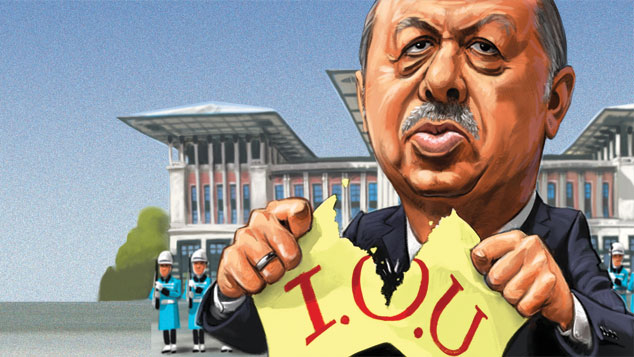
In this week’s MoneyWeek magazine, why the next big emerging-market meltdown will begin in Turkey, why Britain’s new-car market could be heading for trouble, and how not to get ripped off by high fund fees.
Also this week, we have a 24-page special report on pensions and taxation. It covers pretty much everything you need to know about saving for your retirement while keeping it safe from the taxman. You’re probably a bit late now to get a paper copy of it, but if you sign up now, you can get a digital copy – either a PDF or via the smartphone and tablet app. You’ll also get the magazine delivered direct to the address of your choosing, plus every issue on the app, and full access to the MoneyWeek website. It’s remarkably good value, so you should probably click this link and take out a subscription to MoneyWeek magazine now.
Turkey is heading for a default
Emerging market stocks have rallied this year, but investors should be wary of getting over-enthusiastic, says Jonathan Compton in this week’s cover story. “Major sovereign defaults in emerging markets are as predictable as the seasons”, he says. They happen every couple of decades – which means that right now we’re overdue for another one. The last big collapse started in Malaysia in 1997; the one before that was in Mexico in 1982. Jonathan’s in no doubt where the next one will begin: Turkey. His reasoning is sound enough: President Erdogan has all but come out and said that that is what he’s going to do. The trouble is that investor’s aren’t listening. But they should, says Jonathan. “Turkey matters”. In the late 1990s it was a market darling”, and for the last 40 years “its large, relatively stable economy has been a significant stabiliser in the region”. But now, it is “rapidly sinking into ever-darker waters, threatening contagion into other emerging markets.”
Find out why Jonathan is so gloomy for the country’s prospects, and learn how he thinks you should position yourself to protect your wealth with a subscription to MoneyWeek magazine. Remember, click this link and take out a subscription to MoneyWeek magazine now.
Britain’s new-car market could be heading for trouble
The British have long been keen on new cars, says Phil Oakley. The industry is one of the main drivers of our consumer economy, and last year saw a record number of new car registrations. But these days, very few people buy with cash, or even take out a loan for the full amount. According to the Finance and Leasing Association, 86% of new cars sold to private buyers in the last year were sold on a personal contract purchase (PCP). £41bn has been lent out in this way. But now, says Phil, “there are signs the PCP boom is waning – and that has big implications for car buyers, car dealerships, and even the wider economy”. Find out why with a subscription to MoneyWeek magazine.
Don’t get ripped off by high fund fees
If you’ve been paying even the slightest attention to anything we’ve written over the years, it will come as no surprise to you that we think one of the best things you can do to maximise the returns from your investments is to keep your costs down. Costs matter. A lot. David Prosser gives the following example: if you pay £250 a month in to a tracker fund that charges 0.2% and makes 6% a year, you’ll have £40,392 after ten years. Put it into a fund that charges 1% and you’d have £38,748. You’d be down by £1,644. That doesn’t sound too bad, but run the numbers again, this time over 30 years, and you’d be down by £31,244. So it makes sense to get the cheapest funds you can. David explains how click this link and take out a subscription to MoneyWeek magazine now.
A top private equity group and a bet on a recovering oil giant
Elsewhere, Max King picks a private equity fund to invest in. It’s fallen out of favour recently because if its persistently high premium to net asset value, but that shares have quadrupled in the last five years and paid “generous dividends”, so shunning it was definitely a mistake.
On his trading page, Matthew Partridge suggests a bet on an ailing energy company. Its hsare price has fallen by a third in nine months, but the current management “has quietly been getting on with the task in hand of restoring the company to profitability”. It’s a risky punt, certainly, but its “attractive valuation” more than compensates for the risk.
click this link and take out a subscription to MoneyWeek magazine now.
There’s more of course. A lot more. Too much to fit in to this short email. There’s news comment, and the best share tips from the rest of the UK’s financial press. Tips on how to save on your care costs; advice for small businesses; and a primer on the spat between Qatar and its neighbours. Plus six pages of holidays, cars, property and collectables. click this link and take out a subscription to MoneyWeek magazine now